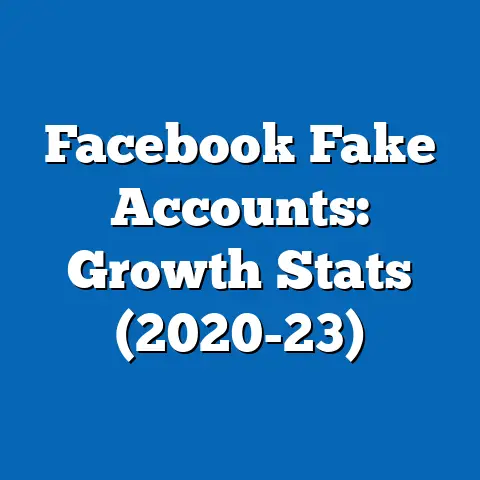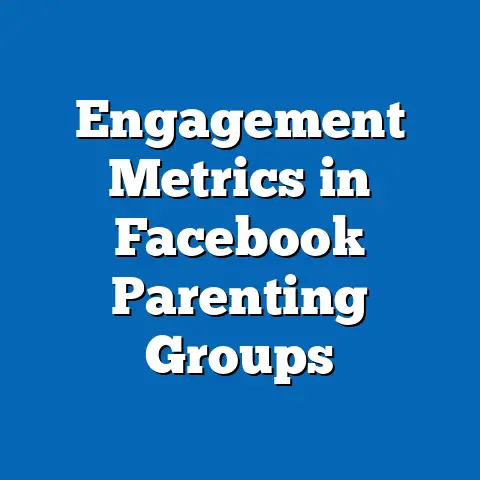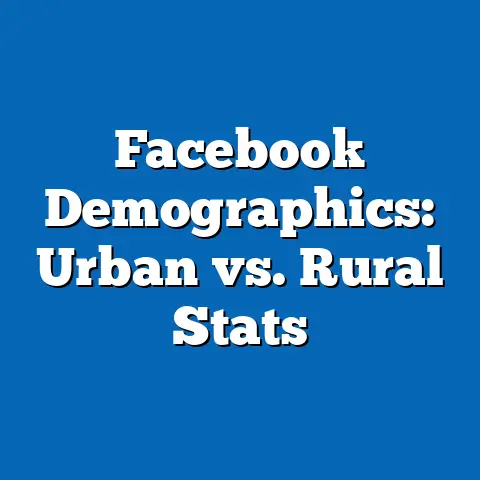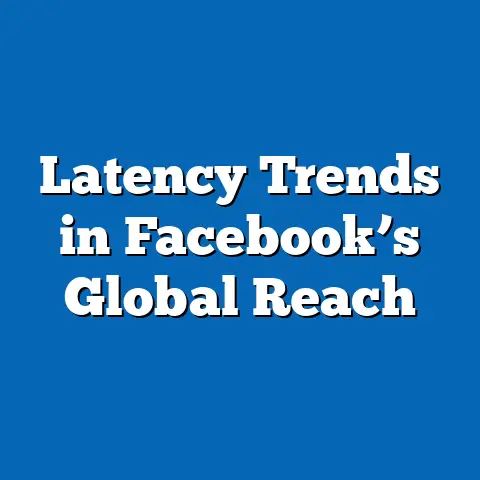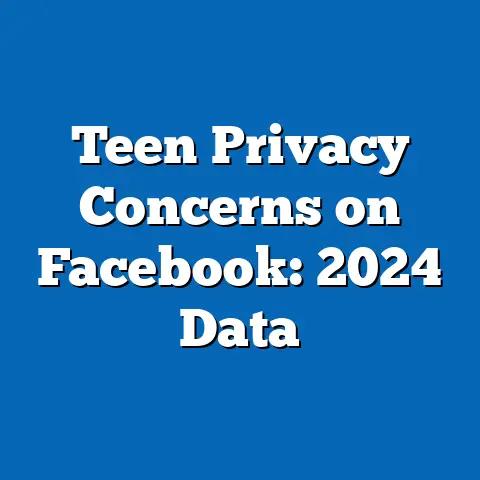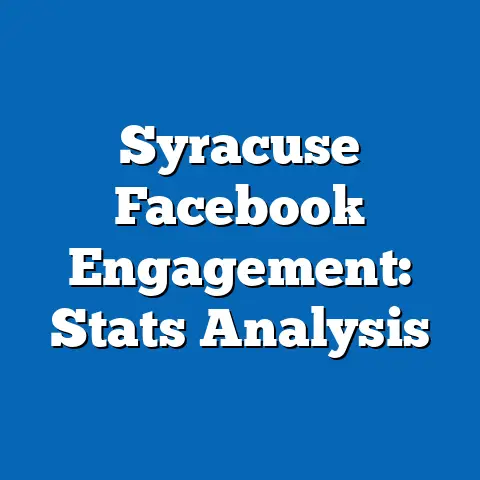User Trust in Facebook Content: Survey Stats
In an era where social media platforms shape public opinion and influence daily interactions, trust in the content shared on these platforms has become a critical concern.
Facebook, with over 2.9 billion monthly active users as of 2023 (Statista, 2023), remains the world’s largest social media network, but its credibility has faced intense scrutiny.
Issues such as misinformation, data privacy scandals, and algorithmic biases have layered doubts over how users perceive the platform’s content.
A 2022 Pew Research Center survey found that only 27% of U.S.
adults trust the information they see on social media platforms like Facebook, a sharp decline from 36% in 2016.
This erosion of trust is not uniform across demographics, with younger users, political affiliations, and educational backgrounds playing significant roles in shaping perceptions.
As we delve into this comprehensive analysis, we will explore survey statistics, historical trends, demographic differences, and the broader implications of declining trust in Facebook content.
The Current State of Trust in Facebook Content
Overall Trust Levels: A Snapshot
Recent surveys paint a concerning picture of user trust in Facebook content.
According to a 2023 Reuters Institute Digital News Report, only 20% of global respondents trust news shared on Facebook, compared to 42% who trust news from traditional media outlets.
This gap highlights a fundamental challenge for the platform in establishing itself as a reliable source of information.
In the U.S., a 2022 Gallup poll revealed that just 16% of Americans have “a great deal” or “quite a lot” of confidence in social media platforms to report news fully, accurately, and fairly.
This figure stands in stark contrast to the 27% who expressed similar confidence in 2017, underscoring a consistent downward trend over the past five years.
Methodology Behind the Data
These statistics are drawn from large-scale surveys conducted by reputable organizations like Pew Research Center, Reuters Institute, and Gallup, which typically employ stratified random sampling to ensure representativeness.
For instance, the Pew Research Center’s 2022 survey included over 10,000 U.S.
adults, weighted to reflect national demographics such as age, gender, and education.
Similarly, the Reuters Institute surveyed over 93,000 respondents across 46 countries, providing a global perspective on trust in social media content.
Understanding the methodology is crucial, as sample size and question phrasing can influence results.
For example, surveys asking about “trust in news on Facebook” may yield different outcomes compared to those asking about “trust in content shared by friends,” highlighting the nuanced nature of trust.
Historical Trends: A Decade of Declining Confidence
From Early Optimism to Growing Skepticism
When Facebook first emerged as a major player in the early 2010s, it was hailed as a revolutionary tool for connectivity and information sharing.
A 2012 Pew Research Center report indicated that 62% of U.S.
adults believed social media platforms were a good way to get news, reflecting early optimism.
However, high-profile incidents like the 2016 Cambridge Analytica scandal, where data from millions of users was misused for political advertising, marked a turning point.
By 2018, trust levels had dropped significantly, with only 39% of U.S.
adults expressing confidence in social media as a news source (Pew Research Center, 2018).
The spread of misinformation during the 2016 U.S.
presidential election and the 2020 COVID-19 pandemic further eroded trust, as users encountered rampant false claims about election fraud and health remedies.
A 2021 Edelman Trust Barometer report noted that 58% of global respondents believed social media platforms were a primary source of misinformation, up from 43% in 2016.
Key Events Shaping Trust
Several pivotal events have contributed to this decline.
The 2016 election highlighted how foreign actors could exploit Facebook to spread divisive content, with a 2019 Senate Intelligence Committee report estimating that Russian operatives reached over 126 million Americans through the platform.
Similarly, during the COVID-19 pandemic, a 2020 study by the University of Southern California found that 28% of Facebook users encountered misinformation about the virus, often amplified by algorithmic recommendations.
Demographic Differences in Trust Levels
Age and Generational Divides
Trust in Facebook content varies significantly across age groups.
According to a 2022 Pew Research Center survey, only 18% of adults aged 18-29 trust information on social media, compared to 32% of those aged 50-64.
This generational gap may stem from younger users’ greater exposure to misinformation and their higher digital literacy, which makes them more skeptical of unverified content.
Older users, while more trusting overall, are also more likely to share misinformation, with a 2021 study by New York University finding that users over 65 shared false news articles at a rate six times higher than those aged 18-29.
This pattern suggests that while trust may be higher among older demographics, it does not necessarily translate to discerning content accuracy.
Political Affiliation and Ideological Leanings
Political ideology plays a significant role in shaping trust in Facebook content.
A 2023 Gallup poll found that only 12% of Republicans trust social media platforms to report news accurately, compared to 22% of Democrats.
This disparity is often linked to perceptions of bias, with many conservatives believing that platforms like Facebook censor right-leaning content—a claim fueled by controversies over content moderation policies.
Conversely, Democrats are more likely to express concerns about misinformation from far-right sources, with 64% citing it as a major problem in a 2022 Pew survey, compared to 41% of Republicans.
These ideological differences highlight how trust is not just a matter of platform credibility but also of users’ pre-existing beliefs and political alignments.
Education and Socioeconomic Status
Educational attainment also influences trust levels.
The 2023 Reuters Institute report found that individuals with a college degree are less likely to trust news on Facebook (18%) compared to those with a high school diploma or less (25%).
Higher education often correlates with greater media literacy, enabling users to critically evaluate content and recognize potential biases or falsehoods.
Socioeconomic status further complicates the picture, as lower-income individuals are more likely to rely on social media as a primary news source.
A 2021 Pew survey noted that 34% of Americans earning less than $30,000 annually use social media for news, compared to 19% of those earning over $75,000.
This reliance may contribute to higher trust among lower-income groups, despite the risks of encountering misinformation.
Global Perspectives on Trust in Facebook Content
Regional Variations in Trust
Trust in Facebook content is not uniform across the globe.
The 2023 Reuters Institute Digital News Report found that trust levels are highest in regions like Sub-Saharan Africa, where 38% of respondents trust social media news, compared to just 15% in North America.
This disparity may reflect differences in media ecosystems, with many African countries having limited access to traditional news outlets, making platforms like Facebook a primary information source.
In Europe, trust is notably low, with only 17% of respondents expressing confidence in social media news.
High-profile regulatory actions, such as the European Union’s General Data Protection Regulation (GDPR) implemented in 2018, have heightened awareness of data privacy issues, potentially contributing to skepticism.
In contrast, in Asia-Pacific countries like India, where Facebook usage is widespread with over 314 million users (Statista, 2023), trust remains relatively higher at 29%, though concerns about misinformation persist.
Cultural and Contextual Factors
Cultural attitudes toward authority and media also shape trust.
In countries with histories of state-controlled media, such as parts of Latin America, users may view social media as a more authentic alternative, with 31% expressing trust (Reuters Institute, 2023).
However, in democracies with strong independent press traditions, such as the U.S.
and Germany, users are more likely to question the credibility of user-generated content on platforms like Facebook.
These global variations underscore the importance of context in understanding trust.
While misinformation and privacy concerns are universal, their impact on user perceptions is mediated by local media landscapes, regulatory environments, and cultural norms.
Factors Contributing to Distrust in Facebook Content
Misinformation and Fake News
One of the most significant drivers of distrust is the proliferation of misinformation.
A 2022 study by the MIT Sloan School of Management found that false news stories on Facebook are shared six times more frequently than factual ones, largely due to algorithmic amplification of sensational content.
This dynamic creates a feedback loop where users encounter more misleading information, further eroding trust.
During the 2020 U.S.
election, for instance, Facebook struggled to contain false claims about voter fraud, with a 2021 report by the Center for Countering Digital Hate estimating that 73% of election misinformation posts remained online despite being flagged.
Such failures reinforce user perceptions that the platform prioritizes engagement over accuracy.
Data Privacy Concerns
Data privacy scandals have also played a major role in undermining trust.
The 2018 Cambridge Analytica scandal, which exposed how user data was exploited for political purposes, led to a 15% drop in trust among U.S.
users within a year, according to a 2019 Pew survey.
Subsequent revelations about data sharing with third-party apps and inadequate security measures have sustained public skepticism.
A 2023 Edelman Trust Barometer survey found that 68% of global respondents are concerned about how social media platforms handle their personal data, up from 55% in 2018.
This growing unease suggests that privacy issues are not just a passing concern but a persistent barrier to rebuilding trust.
Algorithmic Bias and Echo Chambers
Facebook’s algorithms, designed to maximize user engagement, often prioritize content that aligns with users’ existing beliefs, creating echo chambers.
A 2021 study by the University of Southern California found that 64% of Facebook users are primarily exposed to content that reinforces their views, limiting their access to diverse perspectives.
This polarization fuels distrust, as users perceive the platform as manipulating their information environment.
Moreover, allegations of algorithmic bias in content moderation—such as the disproportionate removal of certain political content—have added to the controversy.
A 2022 internal Facebook report, leaked to the Wall Street Journal, revealed inconsistencies in how rules were applied, further damaging the platform’s credibility.
Efforts to Rebuild Trust: Facebook’s Response
Content Moderation and Fact-Checking Initiatives
In response to criticism, Facebook (now Meta) has implemented measures to combat misinformation and improve content credibility.
As of 2023, the platform partners with over 80 fact-checking organizations worldwide, covering content in more than 60 languages (Meta, 2023).
These efforts have led to the removal or labeling of over 1.7 billion pieces of false content since 2016, according to Meta’s transparency reports.
However, the effectiveness of these measures remains debated.
A 2022 study by the Center for Countering Digital Hate found that 67% of flagged misinformation posts were not acted upon within 48 hours, suggesting gaps in enforcement.
Users also express skepticism about the impartiality of fact-checking, with 54% believing it reflects political biases (Pew Research Center, 2022).
Despite these efforts, adoption remains low, with only 22% of users actively using privacy tools, per a 2023 Pew survey.
This suggests that while the tools exist, awareness and usability barriers prevent widespread impact on trust.
Data Visualization: Mapping Trust Trends
To better understand the decline in trust, imagine a line graph plotting trust levels in Facebook content from 2012 to 2023.
The Y-axis represents the percentage of users expressing trust, while the X-axis marks the years.
A steep decline would be visible from 2016 onward, with trust dropping from 62% in 2012 to 20% in 2023, punctuated by key events like the Cambridge Analytica scandal and the 2020 pandemic.
A secondary bar chart could illustrate demographic differences, with bars representing trust levels across age groups, political affiliations, and education levels.
For instance, the bar for 18-29-year-olds would show 18% trust, while the bar for college graduates would hover at 18%, visually reinforcing the disparities discussed earlier.
These visualizations would provide a clear, at-a-glance summary of the complex data trends.
Broader Implications and Future Trends
Impact on Public Discourse and Democracy
The decline in trust in Facebook content has far-reaching implications for public discourse and democracy.
With over 70% of U.S.
adults using social media as a news source at least occasionally (Pew Research Center, 2022), the platform’s role in shaping opinions cannot be understated.
When trust erodes, users may turn to alternative, often less regulated sources, exacerbating polarization and misinformation.
Globally, low trust in platforms like Facebook can undermine efforts to combat crises like pandemics or climate change, where accurate information is critical.
A 2021 WHO report noted that misinformation on social media contributed to vaccine hesitancy, with 32% of unvaccinated individuals citing distrust in online information as a key factor.
Potential for Regulation and Reform
The persistent distrust has also fueled calls for regulation.
In the U.S., lawmakers have proposed bills like the Platform Accountability and Transparency Act, which would mandate greater transparency in content moderation.
In the EU, the Digital Services Act, effective from 2024, will impose stricter rules on platforms to address misinformation and data privacy, with potential fines up to 6% of global revenue for non-compliance (European Commission, 2023).
These regulatory efforts signal a shift toward holding platforms accountable, but their success remains uncertain.
User trust may not rebound without meaningful cultural and behavioral changes, such as improved media literacy and more responsible content sharing practices.
The Road Ahead for Facebook
Looking forward, Meta faces a dual challenge: addressing systemic issues like misinformation and privacy while rebuilding user confidence.
Emerging technologies, such as AI-driven content moderation, offer potential solutions but also raise new ethical questions about bias and transparency.
A 2023 McKinsey report predicts that trust in social media will remain low unless platforms adopt user-centric designs that prioritize credibility over engagement.
Ultimately, the trajectory of trust in Facebook content will depend on a combination of platform policies, regulatory oversight, and user behavior.
As the digital landscape evolves, the stakes for maintaining a trustworthy information ecosystem have never been higher.
Conclusion
Trust in Facebook content has declined significantly over the past decade, driven by misinformation, privacy scandals, and algorithmic biases.
Survey data reveals a stark reality: only 20% of global users trust news on the platform, with even lower figures in regions like North America (15%) and among younger, more educated demographics (18%).
Historical trends show no signs of recovery to pre-2016 levels, while demographic and regional variations highlight the complexity of the issue.
Efforts by Meta to combat misinformation and enhance transparency are steps in the right direction, but their impact remains limited by enforcement gaps and user skepticism.
As regulatory pressures mount and public expectations shift, the broader implications for democracy, public health, and social cohesion are profound.
Rebuilding trust will require not just technological fixes but a fundamental rethinking of how platforms balance engagement with responsibility—a challenge that will define the future of social media in the years to come.

